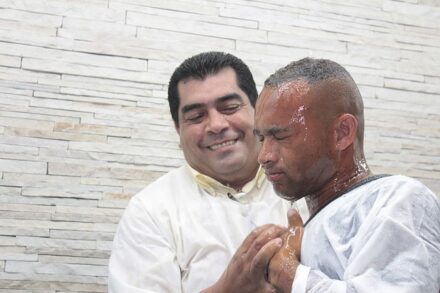This is a continuation of the rules regarding licensed ministers in the United Pentecostal Church. (There are three levels: local, general and ordained.) This covers the very basic cost of holding license and does not include the expense of purchasing books and videos in order to obtain the initial license or to move up to the next level. Those costs greatly increased in 2017 by requiring videos and charging to watch. A former UPC minister friend of mine would sometimes joke that UPC stood for “U pay cash.”
In addition to the yearly national dues, United Pentecostal Church ministers also must abide by the financial requirements of the District in which they reside. Each District sets their own fees.
As an example, the 2014 edition of the Indiana District Manual stipulates that “Each minister in the District shall send 50% or more of his ministerial tithes to the District Secretary-Treasurer on a monthly or at least a quarterly basis.” If a minister does not receive tithes, then a “minimum fee of $35.00 per month shall be sent to the District Secretary by all ministers (except honorary members) who have no ministerial tithe, or whose 50% tithe is less than $35.00. This $35.00 fee is in addition to tithing to the local church.” On top of that, “Each minister …shall pay a sectional fee to his sectional secretary in the amount of $5.00 per month to be paid in advance on at least a quarterly basis.” In Indiana it would cost a minister a minimum of $480 per year to the District, causing their license to cost at least $854.00 per year if they hold a local license.
[2023 Edit: The above fees from Indiana have changed since this article was written. Since January 1, 2022, sectional dues remain the same at $60 per year. District dues are $50 per month for ministers up to age 30, $85 for those age 31 through 69 and $50 per month for ministers who are 70 years and up. It would cost a minister a minimum of $660 per year to the District, causing their license to cost at least $1,034.00 per year if they held a local license. For those having to pay $85 per month, it would cost a minister $1,080 per year to the District, for a total of $1,454 if they held a local license. Screenshot from 10-7-2023.]
[October 18, 2023 Edit: For another example, the fees for ministers in South Carolina are higher than Indiana, at least as of June 13, 2022. Local license is $80 per month, general is $90 and ordained is $100. It would cost a minister a minimum of $960.00 per year to the District, causing their license to cost at least $1,334.00 per year if they held a local license. For the ordained minister, it would cost $1,200.00 to the District, for a total of $1,598.00 per year. Screenshot from 10-18-23.]
For their financial investment, a licensed minister in the United Pentecostal Church receives a digital copy of the Manual and Directory every year and subscriptions to their two main publications, one being a minister’s only quarterly. The only item of any substance, but which most likely will never be used, is the life insurance policy which would provide very little to the minister’s family in a time of need. (They used to send actual paperback book copies of the Manual and Directory. Then they changed to sending them on a CD. Since 2016 they do not even do that, but want the minister to access it online, where they may download it, or pay for physical copies.)
Here is what was stated in 2014 under Article VII, Section 7 under Obligations and Rules:
8. Each minister holding a Local License is required to pay $374 annually into a budget fund, which will entitle said minister to a Manual, a Ministerial and Church Directory, a subscription to the Forward, a subscription to the Pentecostal Herald, and a ten-thousand-dollar group life insurance policy with double indemnity and dismemberment provisions as specified.
9. Each minister holding a General License is required to pay $386 annually into a budget fund, which will entitle said minister to a Manual, a Ministerial and Church Directory, a subscription to the Forward, a subscription to the Pentecostal Herald, and a ten-thousand-dollar group life insurance policy with double indemnity and dismemberment provisions as specified.
10. Each minister holding a Certificate of Ordination is required to pay $398 annually into a budget fund, which will entitle said minister to a Manual, a Ministerial and Church Directory, a subscription to the Forward, a subscription to the Pentecostal Herald, and a ten-thousand-dollar group life insurance policy with double indemnity and dismemberment provisions as specified.
In 2015, numbers 8-10 were condensed and changed and it now reads as follows in 2017:
8. Each minister is required to pay annual membership dues which will entitle the minister to a Manual, a Ministerial and Church Directory, a subscription to the minister’s [In 2018 the word minister’s is removed.] Forward, a subscription to the Pentecostal Herald [In 2018 Herald is changed to Life as they changed the name of the magazine.], and $10,000.00 given to stated recipient at his or her death from a benevolent fund or a group life insurance policy. Membership dues and processing fees are set by the General Conference and cannot be changed without a proper resolution being presented to and adopted by the Conference.
[Starting in the 2021 Manual, this is now found in the same article and section but is listed under “3. Dues (a). The wording has changed to: “Each credentialed UPCI minister is required to pay annual membership dues. They will receive access to a ministers website, a downloadable Manual, and Ministerial and Church Directory, subscriptions to the Forward and the Pentecostal Life, and $10,000.00 given to the minister’s stated recipient at his or her death from a benevolent fund or a group life insurance policy. Membership dues and processing fees are governed and adjusted by the General Conference and cannot be changed without a proper resolution being presented to and adopted by said Conference.” It appears the same through the 2023 Manual.]
How do the costs today compare with the past? Way back in 1952, it was only $6.00, $12.00 or $18.00 to hold license. In 1957, those fees were still the same. By 1965 or earlier, they had increased to $18.00, $24.00 or $30.00. In 1988 licenses cost $204.00, $216.00 or $228.00. In 1989 they increased to $220.00, $232.00 or $244.00 and stayed at that rate through at least 1991. By 2002 or prior, the cost was $291.60, $303.60 or $315.80. In 2003 they changed to $326.00, $338.00 or $350.00. In 2007 the fees increased to their present rate. Some have wondered if they will rise again, now that they relocated to a nicer and more expensive building. [2023 edit: It appears that the national fees have remained at $374, $386 & $398.]
How does this compare to some other Oneness Pentecostal groups? The ALJC, who have the same licensing levels, charge $384.00, $396.00 and $408.00. [2023 Edit: These are now $504, $516 and $528.] Like the UPCI, they also have District dues which vary. Licensing with the Worldwide Pentecostal Fellowship (started due to some ministers leaving the UPCI) is $720.00 per year. Though not comprised of only Oneness Pentecostals, the Global Network of Christian Ministries only charges $250.00 per year. A number of ministers who left the UPCI have held membership with them. [EDIT: Global is no longer in operation.]
In the next installment I will cover the initial costs to apply for licensing.
United Pentecostal Church Manual Part 6
United Pentecostal Church Manual Part 5
United Pentecostal Church Manual Part 4
United Pentecostal Church Manual Part 3
United Pentecostal Church Manual Part 2
United Pentecostal Church Manual Part 1













